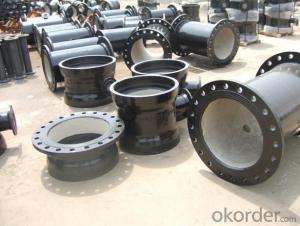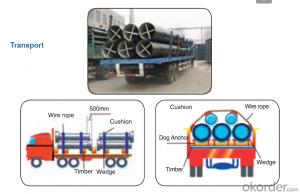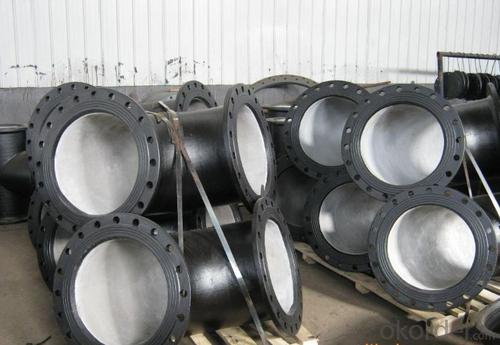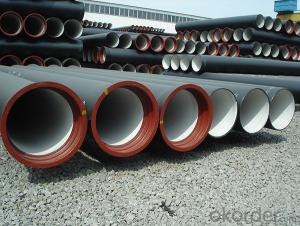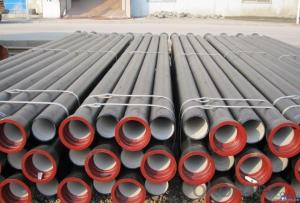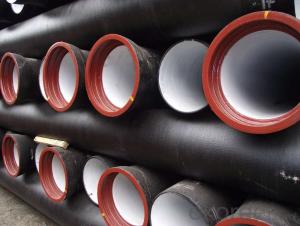Duct Iron Pipe DI Pipe ISO 2531 DN 80-2000mm Flanges
- Loading Port:
- Tianjin
- Payment Terms:
- TT OR LC
- Min Order Qty:
- 100 m
- Supply Capability:
- 100000 m/month
OKorder Service Pledge
OKorder Financial Service
You Might Also Like
Ductile iron pipe fittings:
Dimensions standard:
ISO2531: 50-1000mm, PN10/16
BS4772: 50-1000mm, PN10/16
EN545: 50-1000mm, PN10/16
Connecting mode:
Flanged
Socketed
Mechanical connection
Loose flanged
Coatings:
Inner lined with cement and outside coated with zinc plus bitumen
Inner and outside coated with epoxy resin
Inner and outside coated with fusion bonded epoxy resin
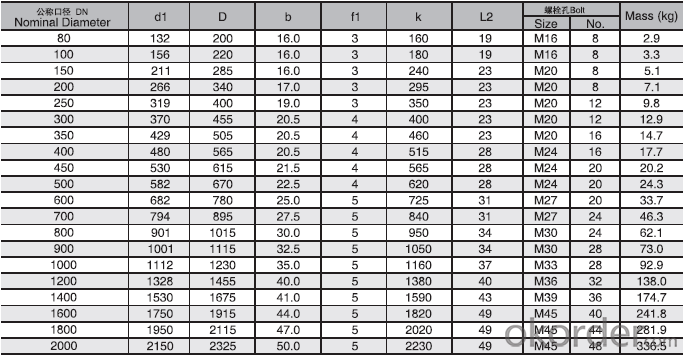
Quality:
ISO 2531 or EN 545 Standard K9 Class, K12 Class
1. ISO 9001 Certificate
2. ISO 2531 & EN 545 Certificate
3. WRAS Potable Water Certificate for FBE Internal Lining
4. WRAS EPDM Rubber Gasket or NBR Rubber Gasket
5. DN80mm - DN2000mm
6. Black Bitumen or Blue FBE / Epoxy Coating
7. Lengh = 6m or cut into 5.6m, 5.7m, 5.8m
8. Client's Brand Customization Allowable
9. Container or Bulk Loading / Shipping
10.Delivery within one Month or According to Client's Order Quantity
11. Support Client or The Third Party Inspection before Shipment
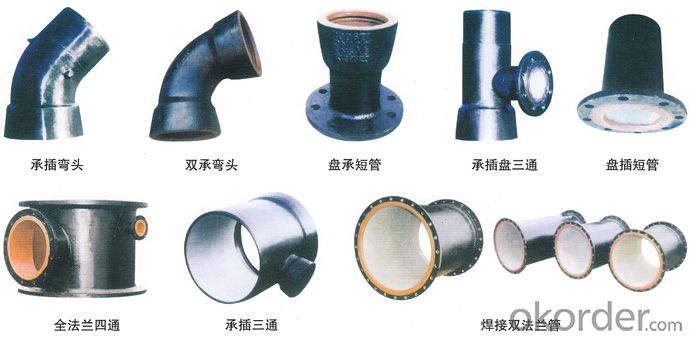
Transport:
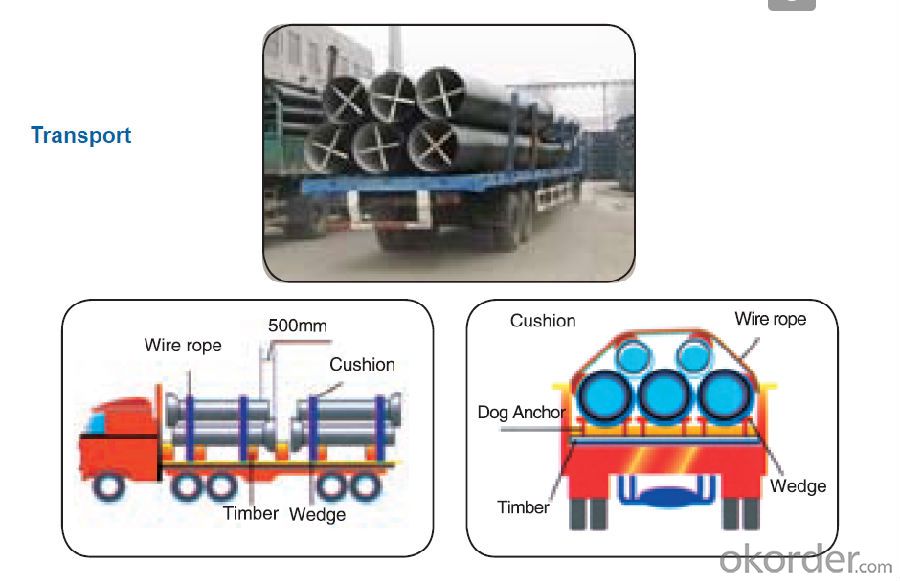
- Q: Are ductile iron pipes suitable for oil and gas pipeline applications?
- Yes, ductile iron pipes are suitable for oil and gas pipeline applications. Ductile iron pipes have numerous properties that make them ideal for use in such applications. Firstly, ductile iron pipes have high tensile strength, which allows them to handle the high pressure and stress associated with oil and gas transmission. This ensures that the pipes can withstand the demanding conditions and maintain structural integrity over time. Secondly, ductile iron pipes are highly resistant to corrosion. Oil and gas pipelines are exposed to various corrosive elements, such as water, chemicals, and salts. Ductile iron pipes have a protective lining, typically made of cement mortar or polyethylene, which prevents corrosion and extends the lifespan of the pipes. Additionally, ductile iron pipes have excellent durability and longevity. They have a long service life, typically ranging from 50 to 100 years, depending on the specific conditions and maintenance practices. This makes them a reliable choice for oil and gas pipeline applications, reducing the need for frequent replacements and minimizing downtime. Furthermore, ductile iron pipes have good flexibility, allowing them to withstand ground movement and absorb shocks and vibrations. This flexibility is particularly important in oil and gas pipeline applications, where the pipes need to adapt to changing terrain and environmental conditions. Lastly, ductile iron pipes are cost-effective compared to other materials commonly used in oil and gas pipelines, such as steel. They offer a favorable balance between performance and price, making them a practical choice for both large-scale and small-scale pipeline projects. Overall, the combination of high tensile strength, corrosion resistance, durability, flexibility, and cost-effectiveness makes ductile iron pipes suitable for oil and gas pipeline applications.
- Q: Ductile iron pipe in the direction of it?
- The utility model is mainly used for conveying water, and is an ideal choice for tap water pipes.
- Q: How does ductile iron pipe handle traffic loads and vibrations?
- Ductile iron pipe is known for its excellent strength and flexibility, allowing it to efficiently handle traffic loads and vibrations. Its superior durability and resilience enable it to withstand heavy vehicle traffic without experiencing significant deformation or damage. Additionally, the material's inherent vibration-damping properties help to minimize the transmission of vibrations caused by traffic, ensuring a smoother and quieter flow of traffic. Overall, ductile iron pipe is a reliable and robust choice for managing traffic loads and vibrations effectively.
- Q: What are the different coating thickness options for ductile iron pipe?
- The different coating thickness options for ductile iron pipe vary depending on the specific application and requirements. However, common coating thickness options for ductile iron pipe range from 200 to 400 microns.
- Q: Which is better, ductile iron pipe and spray plastic pipe?
- Spray pipe is: plastic composite pipe, steel pipe is a new composite material as matrix, through a special process in high temperature curing by walls melt spraying or adsorption of food grade epoxy powder coating or PE as raw material. It has excellent corrosion resistance and relatively small frictional resistance.
- Q: What are the typical bedding and backfill requirements for ductile iron pipes?
- The typical bedding and backfill requirements for ductile iron pipes involve using a granular material, such as sand or gravel, to provide proper support and cushioning for the pipe. The bedding material should be placed evenly around the entire circumference of the pipe, ensuring that it is in direct contact with the bottom of the pipe and extending to a certain height above it. Backfill material, on the other hand, is used to fill the remaining space around the pipe and should be placed in layers and compacted to prevent settlement. Additionally, proper compaction and compaction equipment should be used to ensure the stability and long-term performance of the ductile iron pipes.
- Q: How are ductile iron pipes made?
- Ductile iron pipes are made using a specific manufacturing process known as centrifugal casting. This process involves pouring molten iron into a rotating mold, which is usually made of steel. The centrifugal force created by the rotation of the mold helps in distributing the molten iron evenly, ensuring the final product is of high quality. To begin the manufacturing process, a mixture of scrap iron, steel, and recycled material is melted in a furnace at extremely high temperatures. Once the molten iron reaches the desired temperature and consistency, it is ready to be cast into pipes. The rotating mold is first preheated to prevent the molten iron from cooling too quickly. The preheating process also helps in ensuring a smooth surface finish of the pipes. Next, the molten iron is poured into the rotating mold through a central sprue. As the mold spins, the molten iron is forced against the inner walls of the mold due to centrifugal force. This causes the iron to solidify rapidly, resulting in a dense, strong, and corrosion-resistant pipe. The centrifugal force also helps to remove any impurities or slag from the inner surface of the pipe, further enhancing its quality. Once the casting process is complete, the mold is allowed to cool, and the pipe is removed. The pipes are then subjected to various tests to ensure they meet the required quality standards. These tests may include checking the dimensions, mechanical properties, and surface finish of the pipes. After passing the quality tests, the ductile iron pipes are typically coated with a protective lining to prevent corrosion and extend their lifespan. This lining can be made of cement mortar, epoxy, or polyethylene, depending on the intended application of the pipes. In summary, ductile iron pipes are made through the centrifugal casting process, which involves pouring molten iron into a rotating mold. This process ensures the production of strong, corrosion-resistant pipes with a smooth surface finish.
- Q: Are ductile iron pipes suitable for installation in rocky or hard soil conditions?
- Yes, ductile iron pipes are suitable for installation in rocky or hard soil conditions. Ductile iron pipes are known for their strength and durability, making them well-suited for challenging soil conditions. Their high tensile strength allows them to withstand external loads and pressures, including the presence of rocks or hard soil. Additionally, ductile iron pipes are resistant to corrosion, which further enhances their suitability for installation in such conditions. The pipes' flexibility and ability to withstand bending stresses also make them a reliable choice for rocky or hard soil conditions, as they can accommodate ground movement without compromising their structural integrity. Overall, ductile iron pipes are a preferred option for installations in challenging soil conditions due to their robustness, longevity, and resilience.
- Q: What is the difference between flexible joint mechanism and seismic cast iron pipe DN100 and ductile iron pipe?
- Nodular cast iron has high strength and strong plasticity. The tensile strength of ductile iron is twice that of gray iron, and the yield strength even exceeds that of cast steel.
- Q: Can ductile iron pipes be used for rainwater harvesting systems?
- Yes, ductile iron pipes can be used for rainwater harvesting systems. Ductile iron pipes are known for their durability and strength, making them suitable for various applications, including rainwater harvesting. These pipes are resistant to corrosion and can withstand high pressure, which is essential for transporting rainwater from the collection point to storage tanks or distribution systems. Additionally, ductile iron pipes have a long lifespan, reducing the need for frequent replacements and making them a cost-effective choice for rainwater harvesting systems.
Send your message to us
Duct Iron Pipe DI Pipe ISO 2531 DN 80-2000mm Flanges
- Loading Port:
- Tianjin
- Payment Terms:
- TT OR LC
- Min Order Qty:
- 100 m
- Supply Capability:
- 100000 m/month
OKorder Service Pledge
OKorder Financial Service
Similar products
Hot products
Hot Searches
Related keywords
